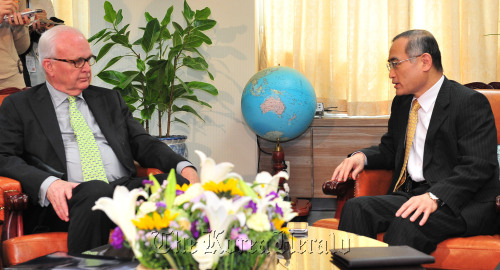The U.S. is likely to soon send a delegation to North Korea to examine its food shortages, but allies’ cooperation over the issue of resuming aid on a full-scale basis will not be undermined by the move, officials from Washington and Seoul said Tuesday.
Stephen Bosworth, U.S. special envoy on North Korea policies, held talks with Seoul’s chief nuclear envoy Wi Sung-lac here as the two ally nations are trying to come up with the best way to resume peace talks and food assistance to Pyongyang.
While admitting his government will soon be “making a decision” on the issue of sending a delegation to Pyongyang to check on its food conditions, the senior U.S. diplomat said South Korea and the U.S. remain “very together” on overall issues regarding the North.
“The atmosphere and reality of coordination between the U.S. and South Korea (are) very, very good,” Bosworth told reporters here, dismissing speculations over their possibly divided stance. “We have a very strong common view.”
South Korea has been facing increasing international pressure to resume shipments of food to the impoverished North with reports saying even its staunchest ally Washington will be sending aid soon.
Reports have said that a team of U.S. officials led by special envoy Robert King may soon travel to Pyongyang, hinting at a lingering prospect of Washington resuming direct contact with the communist state.
South Korea’s Foreign Ministry spokesperson echoed the U.S. official’s remarks, adding Washington was “likely to make its final decision on the food assistance” after King’s travel to the communist state.
Stephen Bosworth, U.S. special envoy on North Korea policies, held talks with Seoul’s chief nuclear envoy Wi Sung-lac here as the two ally nations are trying to come up with the best way to resume peace talks and food assistance to Pyongyang.
While admitting his government will soon be “making a decision” on the issue of sending a delegation to Pyongyang to check on its food conditions, the senior U.S. diplomat said South Korea and the U.S. remain “very together” on overall issues regarding the North.
“The atmosphere and reality of coordination between the U.S. and South Korea (are) very, very good,” Bosworth told reporters here, dismissing speculations over their possibly divided stance. “We have a very strong common view.”
South Korea has been facing increasing international pressure to resume shipments of food to the impoverished North with reports saying even its staunchest ally Washington will be sending aid soon.
Reports have said that a team of U.S. officials led by special envoy Robert King may soon travel to Pyongyang, hinting at a lingering prospect of Washington resuming direct contact with the communist state.
South Korea’s Foreign Ministry spokesperson echoed the U.S. official’s remarks, adding Washington was “likely to make its final decision on the food assistance” after King’s travel to the communist state.

“But even if King were to go to North Korea, the trip itself does not represent the U.S. government’s stance on food aid to North Korea,” spokesman Cho Byung-jae told a regular press briefing.
A senior Seoul official also downplayed the meaning of King’s purported trip saying it “does not mean more than a fact-finding trip” ahead of the final decision-making.
With its own circumstances to consider, South Korea will not be influenced by Washington’s timing of resuming the stalled aid to Pyongyang, the official added.
Since taking office in 2008, President Lee Myung-bak in Seoul has been firm on not sending aid to Pyongyang unless it keeps to its pledge to denuclearize. Shipments of food stopped completely last year, when North Korea conducted two deadly attacks that killed 50 South Koreans.
Washington, which remains undecided over the issue on the surface, has formerly been firm not to resume talks or aid before Seoul is satisfied with Pyongyang’s apology over last year’s violence. The North remains mute over the issue.
According to the U.N., more than 6 million North Koreans, about a quarter of the communist state’s population, need urgent aid of some 475,000 tons of food.
Seoul and Washington are also “very clear and consistent” toward the position that North Korea’s uranium enrichment program is “illegal under various U.N. Security Council resolutions,” Bosworth said.
North Korea unveiled a new uranium enrichment facility to outside experts in November, sparking concerns over its ongoing nuclear ambitions. Uranium enrichment could provide Pyongyang with an additional way of making atomic bombs, second to its existing plutonium.
“We had very good and constructive conversations addressing where we now are in our joint effort with regard to North Korea and North Korea’s nuclear program,” Bosworth said. “We also … talked about things we might do to be ready for future developments.”
Bosworth’s visit comes as partners of the stalled multinational nuclear disarmament talks have been trying to get the chief nuclear envoys of the two Koreas to meet as the first step toward restarting full-scale negotiations. The six-nation denuclearization talks, involving the two Koreas, the U.S., Japan, China and Russia, have been suspended since the end of 2008.
While South Korea has been positive toward the suggestion, made by China, North Korea has yet to unveil its position.
During his three-day trip that ends Wednesday, Bosworth will meet with other senior officials here, including Chun Yung-woo, presidential secretary for foreign affairs and security, and Unification Minister Hyun In-taek, the Foreign Ministry said.
By Shin Hae-in (hayney@heraldcorp.com)






![[KH Explains] How should Korea adjust its trade defenses against Chinese EVs?](http://res.heraldm.com/phpwas/restmb_idxmake.php?idx=644&simg=/content/image/2024/04/15/20240415050562_0.jpg&u=20240415144419)











![[Today’s K-pop] Stray Kids to return soon: report](http://res.heraldm.com/phpwas/restmb_idxmake.php?idx=642&simg=/content/image/2024/04/16/20240416050713_0.jpg&u=)